Unjoo Moon’s biopic about Helen Reddy
The new biopic about Australian singer Helen Reddy and her struggle to reach success in the US is an inspiration for our times.
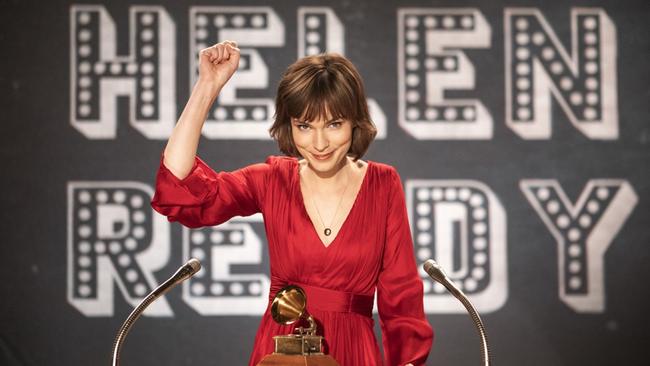
Unjoo Moon was getting into her car when a young woman came running towards her, shouting her name. The Sydney-born, Los Angeles-based director had just attended the premiere screening of her new movie I Am Woman and was still on a high from the standing ovation the 2000-strong crowd gave her for her biopic on Australian singer and feminist icon Helen Reddy.
“She must have been about 19 or 20 and she said to me, ‘Thank you, thank you so much for that movie. I only came for my mother but I learnt so much, and I was touched and so moved by that story and what happened to the women before me’,” Moon recalls. “The girl went on to say she was so inspired to keep going out there and keep making change. At that moment I thought, that reaction is exactly what I wanted; it was one of the big intentions of making this film.”
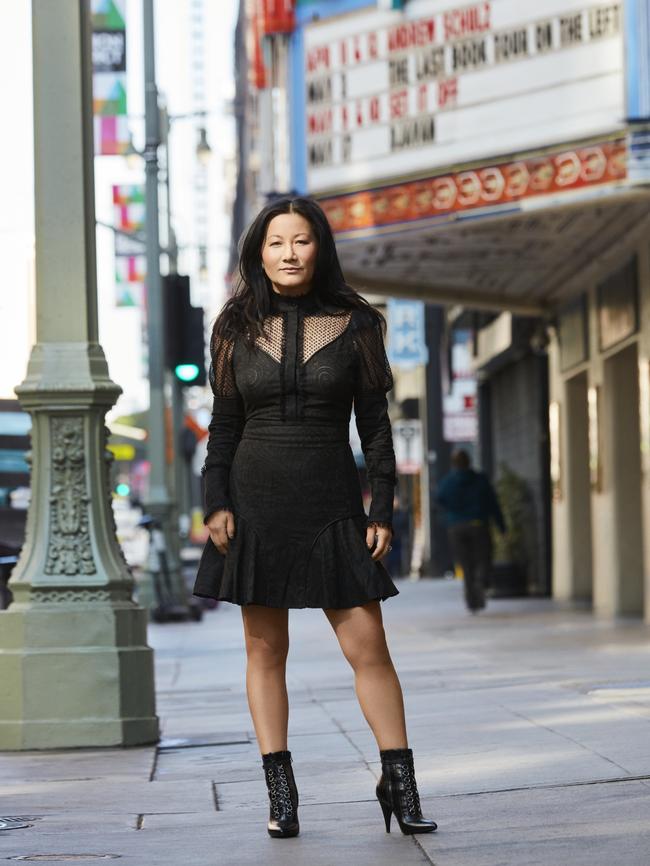
The director is talking to WISH over the phone from her home in Los Angeles. She has just stepped off the plane from London, where she spoke at an International Women’s Day breakfast about the importance of telling strong female stories to the next generation of women (this was just before gatherings began to be restricted due to the COVID-19 virus). She has been flying around the world promoting I Am Woman – her first narrative feature film – since it premiered at the Toronto International Film Festival last September. But her journey to make this movie started long before that – almost six years ago at a pre-Oscars dinner.
“I was at a G’Day USA awards night, and I saw a woman sitting down and quite a few people hovering,” Moon recalls. “I asked Jacki Weaver, who I was sitting next to, who it was and she said it was Helen Reddy. As soon as I realised, I swapped seats with my husband [Oscar-winning cinematographer Dion Beebe] so I could be next to Helen because I really wanted to talk to her.”
Moon, who grew up on Sydney’s north shore, was too young to appreciate Reddy’s song I Am Woman when it came out in the early ’70s and became the anthem for the women’s liberation movement. But she does remember the impact Reddy’s songs had on the older women around her.
“I had this very strong memory of when Helen’s music came on in the car, and my mother and her friends – very intelligent but homemakers due to the era – would wind down the windows of the Volvo station wagon and put their fists in the air,” Moon says. “So I just really wanted to talk to Helen and understand what it was about her and her life and her music that would make women feel so bold and empowered.”
Reddy and Moon clicked, and by dessert the director realised Reddy had an incredible story that would make an amazing movie. Moon’s first thought was that someone surely had told the tale of the singer before, given her extraordinary career. Reddy was the first Australian to win a Grammy for Best Female Pop Vocal Performance and to have three number-one hits in the US in one year. She sold 25 million albums, had her own television program, The Helen Reddy Show, in the 1970s and was a guest on many others. Alice Cooper dubbed her “the queen of housewife rock” and even her Grammys speech was memorable when she thanked God “because She makes everything possible”.
And that’s before you delve into Reddy’s personal life. The Melbourne-born performer arrived in New York in 1966 with her three-year-old daughter Traci, two suitcases and $US230 in her pocket, having being told she had a recording contract after winning Bandstand. Her hopes were quickly dashed, however, when the record company said they were not interested in female artists, and she should enjoy the city of New York and then go home.
The then-25-year-old didn’t give up, instead singing in almost empty music clubs and scraping
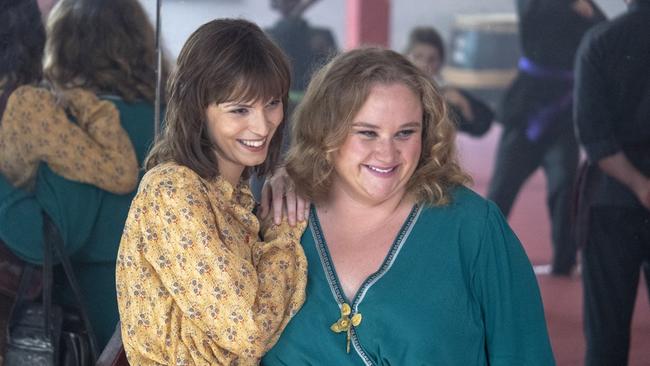
by, before becoming close friends with legendary Australian music journalist Lillian Roxon and meeting her second husband, and manager, Jeff Wald. These two played key roles in the writing of the breakthrough song I Am Woman as well as in Reddy’s overall success.
“I walked away from that dinner convinced that someone had already made a film, so I was really, really surprised when there wasn’t one,” says Moon. “Helen is a very private person, so it took me a long time to ease the stories out of her. Initially we talked about doing a documentary because she would have been a lot more comfortable with that, but ultimately it really should be a feature film because we could tell the story in a more concise way. But I had to really convince Helen it was worth doing.”
That convincing took a long, long time. Moon spent more than 12 months gaining Reddy’s trust – going to lunch, spending hours talking, walking on the beach, meeting her son Jordan and daughter Traci. There was a lot of archival material available, including performance footage and Reddy’s television show, and the singer had even written a book. But Moon wanted more; she wanted to hear the stories from Reddy herself. “I just wanted to get to the heart of her own personal experience.”
“When Helen and I agreed to make a movie, I remember saying to her that this was going to be a narrative film; I am not going to get every single detail right, I am not going to get everyone in the film, I may combine two people into one character,” Moon recalls. “But the one thing I can promise you is that I will absolutely honour who you are, what your life has been and what your music has meant to people. I think that was always the core of what I felt the film needed to be.”
Moon enlisted her husband, Dion Beebe, for cinematographer duties, hired Australian screenwriter Emma Jensen to author the screenplay, and partnered with producer Rosemary Blight to make the movie. She decided it should be an Australian project – even though it is set entirely in the US – because she believed so many Australians have followed in Reddy’s footsteps. “Think about how many Australians have that dream and really want to pursue their passion and come to America,” she says. “There are so many people who have done it [including Moon and Beebe, who met at film school in Sydney and left for LA in the late 1990s]. “But in the 1960s, Helen was one of the first.”
Once Moon and Blight had secured funding (with some coming from Screen Australia, Create NSW and the Goodship Women’s Fund), they set about finding their Helen. It was almost as lengthy a process as getting Reddy herself over the line. Moon spent 12 months working with casting agencies in five different countries to find the right actress for the role, but had no luck. That all changed when she spotted a photo of Australian actress Tilda Cobham-Hervey in a magazine. “I was really struck by her,” Moon recalls. “I felt like there was a quality to her. Not necessarily that she looks like Helen, but there was a quality in the way she stood in this photo that reminded me of Helen.”
The director did some research and found that Cobham-Hervey, despite being only 22, had an impressive body of work and shared a lot of similarities with Reddy in her upbringing. Both she and Reddy had grown up in show business families and had been on stage since they were children. “It gave Tilda an incredible confidence beyond her years that you could see on the screen,” says Moon. “I don’t think she realised but I knew within the first hour of meeting her that she would make a remarkable Helen Reddy. I had to fight to get her on the film, but it was worth it. It is tricky casting for a biopic because what everyone looks for is physical resemblance, but it is more than that. You really have to capture the spirit of the person, and I think Tilda has that spirit innately.”
The second key – and equally difficult – piece of casting was the actor who would play Jeff Wald, Reddy’s second husband and manager. The singer met Wald in New York, fell in love and quickly married him, moving to Los Angeles, where he helped launch her career. But the charming Wald also had a dark side – an addiction to cocaine – which led to their marriage breakdown as well as a sea of debt. Moon realised she needed an actor who could convey the passion/charisma that Reddy fell for but also become essentially the antagonist. The director did meet Wald, but not until much later in the production, and she was rather reluctant to do so as she wanted to make the movie from Reddy’s point of view.
“I got a phone call from Jordan saying Jeff wants to have lunch with you,” Moon recalls. “I got to the restaurant early – that is how nervous I was – and he was 20 minutes late. He arrived at 1:20pm and we didn’t leave the table until 7:30pm. Jeff is one of the most engaging, fascinating, charming people that you ever meet. He is passionate but also crazy. Part of the craziness is part of the brilliance.”
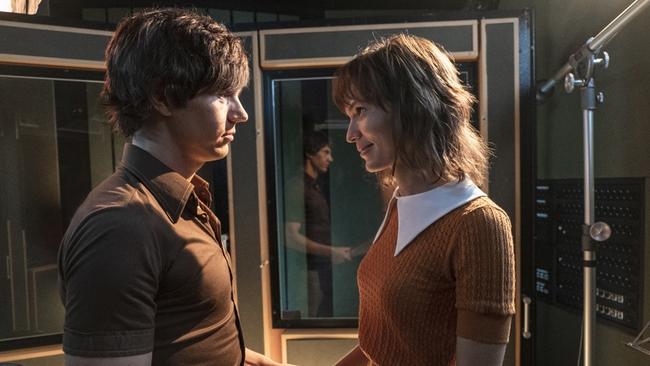
Moon found her Jeff Wald when she met American actor Evan Peters, who has spent the past few years on American Horror Story. At the time they met, Peters had bleached blonde hair and looked nothing like Wald, but Moon was immediately struck by his combination of “deep intelligence” and playfulness. “When I met Evan, I thought he was extraordinary,” she says. “You look at him and you totally adore him, but at the same time you see a darkness. I thought Evan would be able to walk that line very well so you could understand him from Helen’s point of view.”
IT’S late on a hot day in December in 2018, just before Christmas, and a dozen or so people are milling around the Enmore Theatre in Sydney’s Newtown. On closer inspection, the men are wearing mission-brown suits and the women caramel skirts, purple turtlenecks and corduroy vests, and this writer feels like she has stepped back in time to the 1970s. There’s good reason for that, however, as Moon is shooting the final scenes of I Am Woman.
WISH has been invited onto the set to see how the production team has transformed the Enmore Theatre into the television studio where The Helen Reddy Show was filmed. Cobham-Hervey is on stage, performing the chorus of the famous song while Beebe sits behind his camera, Moon next to him, and a dozen other crew buzz around adjusting lighting and make-up, and getting water for staff. After a few takes, Moon gives the thumps up.
“Well done guys, well done,” Moon says. And then it’s straight on to the set-up for the next scene. There is no messing about in this production, as time is as tight as money. The whole movie is being shot mostly in Sydney, with the city transformed into New York and LA. “Money buys you the ability to change your mind a lot,” Moon later tells WISH. “So when it is a tight schedule and you don’t have endless amounts of money, you have to be very well planned. That is where I had the incredible advantage of being able to work with Dion. We don’t only know each other really well, we are married, and so we get to go home together and get to talk to each other at night. It was a 24/7 experience. At the end of a shooting day, we would be able to watch dailies and talk about it.”
It is not the first time the husband-and-wife team have worked together. Over the years they have made television commercials, documentaries and music videos, and they share parenting of their 15-year-old son Axil. “When I made this film I had an incredible team that was helmed by the partnership with Dion on every level, and he is an extraordinary cinematographer in not just storytelling but music as well,” Moon says. Beebe won an Oscar for his work on Memories of a Geisha, and was behind the camera for Mary Poppins Returns and Chicago as well as dozens of other movies. The pair spent 33 days shooting I Am Woman and then editing it in Sydney and LA.
One of the first screenings of the finished film was also one of the most difficult for Moon and Beebe. They showed it to Reddy and her children. “I was so busy at that stage and I didn’t really have the time to think about the fact that I was going to be screening a movie I had made about Helen’s life, through my eyes, to her,” Moon says, laughing. “When we all sat down and the film started I started to panic, because it suddenly hit me what we were doing. I did have a mild panic attack.”
Fortunately for the director, her panic was misplaced. Reddy was absolutely engrossed in the film, singing along to the songs and understandably devastated at revisiting the more tragic parts of her life story. At the end of the screening, the 78-year-old started crying.
“It was just this relief for her, as she had embraced her story, embraced her life and it was a very cathartic moment for her,” Moon recalls. “She cried, then I cried – I think everyone in the theatre cried. She then hugged her children and then hugged me and I knew I had her blessing, and that meant so much to me.”
Wald was equally impressed. Moon says he also had tears in his eyes and told her she had done a “f*cking amazing” job. “Jeff is prepared to own his faults,” she says. “He wanted this film to be made, he wanted Helen’s story to be told. He should be also very proud of the fact that he really believed in the feminist message and that he really supported Helen. Jeff is still a feminist.”
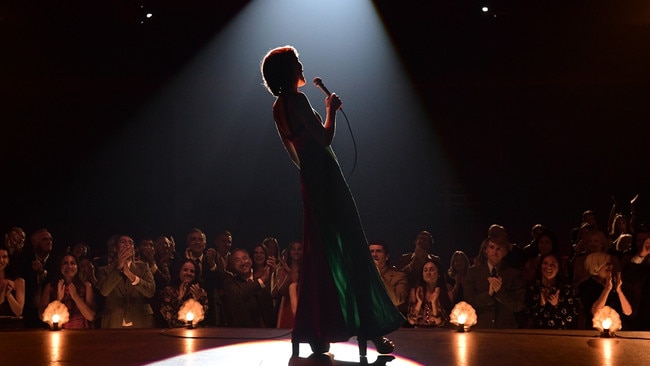
The movie, due to be released later in the year in Australia, is undoubtedly a feminist piece set in a time when women were marching for change. But what struck Moon and many others – this writer included – is that although the piece is set almost 40 years ago, women are still having to march for change. Is this inspiring, or just a bit depressing? “I know exactly what you are talking about,” Moon says of the mixed emotions the film evokes in a feminist. “I actually found I felt the same way when I began researching the movie, but then I learnt so much talking to Helen, the things that women had done before me that I just didn’t know. They are not big things, they are just small things that have paved the way for all of us as women.”
Moon managed to get some of these things in the film, including a scene in which Reddy finally gets a credit card with her own name on it (previously women only had credit cards bearing their husband’s name). “Everyone keeps saying to me ‘it is so great and inspiring that you are making this film but I wouldn’t be here without the work that women did before me’,” she says. “I think I found that really inspiring – but also a wake-up call – because we can’t rest on the work the women did before us.”
It is for this reason Moon gets immense satisfaction from the positive reaction she has received from younger females; getting the Millennials to sing along loudly with I Am Woman, just as her mother did. “I thought, this is really interesting, because there is a whole generation of women who don’t know anything about Helen Reddy and don’t know a whole lot about feminism in the 1970s,” she says.
“A film director friend of mine brought his daughter to a screening in Los Angeles, and the next day she FaceTimed him and she was driving to school in her car and I Am Woman was playing loudly in the background. I really loved that, because as soon as I met Helen I just knew this was a really important story to tell.”




To join the conversation, please log in. Don't have an account? Register
Join the conversation, you are commenting as Logout